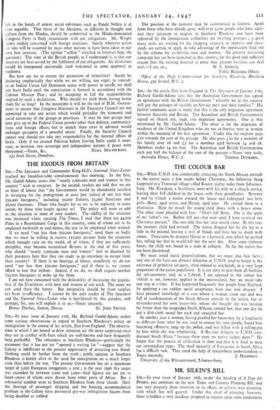THE COLOUR BAR
SIR, While U.N.O. was comfortably criticising the South African attitude to the native races a few weeks before Christmas, the following thing happened in a Transvaal village called Koster, eighty miles from Johannes- burg. Mr. Kraukam, a bricklayer, went with his wife to a church service, leaving their five children in the house with their grandfather. Between 8 and to o'clock a native entered the house and kidnapped two little
girls—Betty, aged seven, and Hester, aged nine. He carried them to a plantation. Here he struck the young child down with a heavy stone.
The elder sister pleaded with him : " Don't kill Betty. She is the apple of my father's eye. Rather kill me—but wait until I have received my Christmas present." She was told that her turn would come. By this time the younger child had revived. The native dragged her by the leg to a hole in the ground, leaving a trail of blood, and beat her to death with stones. Thereupon he dragged Hester to a haystack, into which he pushed her, telling her that he would kill her the next day. After some eighteen hours, the child was found in a state of collapse. So far the native has not been discovered.
We must avoid racial generalisations, but we must also face facts ; and one of the facts our abstract delegates at U.N.O. tend to forget is the existence of primitive savagery, often related to witchcraft, in a very large proportion of the native population. It is our duty to give them all facilities for advancement, and, as a Liberal, I am opposed to the colour bar
(which is not, however, applied in the universities), but we must take one step at a time. It has happened frequently that people from England, by applying a too sudden social acceptance, have run into disaster. I have personal knowledge of a case where a woman came out and was full of condemnation of the South African attitude to the native, but so misunderstood her own house-boy, whom she thought she was treating far. better than the misguided South Africans around her, that one day he put a dish-cloth round her neck and strangled her.
In another case a woman, having puzzled her house-boy by a familiarity so different from what he was used to among his own people, found him
becoming offensive, rang up the police, and was killed with a rolling-pin by him while she was telephoning. A Russian delegate at U.N.O. con- demned South Africa " because there were no native judges there." He forgot that the process of civilisation is slow and that it is fatal to miss out intermediate steps. The small minority of Europeans in South Africa has a difficult task. They need the help of sympathetic understanding.—


































 Previous page
Previous page